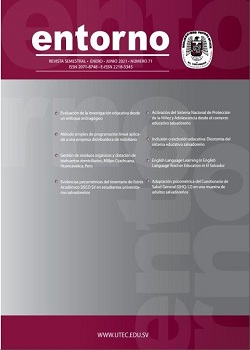Management of organic waste and provision of home biogardens, Millpo Ccachuana, Huancavelica, Perú
DOI:
https://doi.org/10.5377/entorno.v1i71.14318Keywords:
Waste management – Millpo Ccachuana, Huancabelica, Perú, Organic waste, Biological agriculture – Millpo Ccachuana, Huancavelica, PerúAbstract
The main objective of this study was to determine the effect on the reutilization of organic solid waste (RSO, given its Spanish acronym) in the implementation of home biogardens in order to improve food production in the Human Settlement of Millpo Ccachuana (AHMCC, given its Spanish acronym) in the district of Ascención, Huancavelica, Perú. Data collection took place by means of a survey; a questionnaire was used as the data collection tool with the purpose of finding out the degree of knowledge that the population have in regards to RSO, by identifying their management problems, defining actions to encourage the population to be part of the environmental awareness process by means of theoretical-exposition strategies, and analyzing their present situation through the use of entry and exit surveys. Results showed the interest of the inhabitants in cooperating with a project of this magnitude, in such a way that, initially, 51% of the surveyed households did not classify nor reused organic waste; however, after the sessions and the establishment of biogardens, 96% of households improved their use of organic waste by classifying and reusing them according to their nature or generation. It is worth mentioning that within the conclusions, the management of RSO—which frames management of all those activities that lead to minimizing the impact of RSO in health, the environment and the aesthetics of AHMCC has had a direct positive impact in the quality of life of its inhabitants, who, because of the lack of an adequate RSO management system, have suffered from different diseases [in the past].
Downloads
410
Downloads
Published
How to Cite
Issue
Section
License
Copyright (c) 2021 Universidad Tecnológica de El Salvador

This work is licensed under a Creative Commons Attribution-NonCommercial-ShareAlike 4.0 International License.
© Entorno
It is required that the authors transfer the right of re-production of their articles to the Entorno Journal

